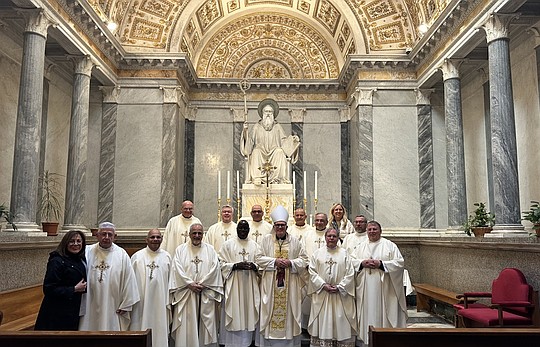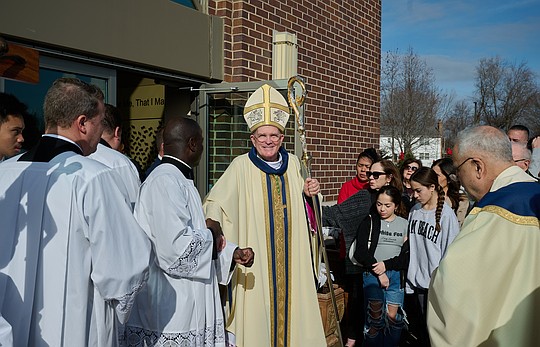Father Koch: The garden and the desert point us in different directions
February 23, 2023 at 9:01 p.m.

The beginning of the Lenten journey opens in the Garden of Eden where Eve and Adam are tricked into eating the forbidden fruit. Using hyperbole and twisting the truth, the wily serpent manages to entice Eve to listen to him instead of to the instruction given them by the Lord. Her presence in the garden near the tree of forbidden fruit indicates that she was already intrigued enough by it to be open to the possibility of testing the boundaries. The serpent did not trick her into doing something that she wasn’t already disposed to do.
The quick and unquestioning complicity of Adam in sharing the fruit once she has eaten of it also raises questions about his intent. When questioned about his eating of the tree he immediately calls her out instead of accepting any blame for himself. He shows himself as one of divided loyalty. On one hand he eats the fruit once he knows that Eve has as well so that she does not suffer the consequences on her own, but then he is quick to call her out to mitigate her responsibility. She, for her part, points to the serpent who has no response, thereby carrying the brunt of the blame.
Forced now from the garden, Adam and Eve enter the wilderness, where the work of raising food and caring for themselves and their children, becomes daunting and burdensome. From this point on, they and their descendants longed for the Garden. Human sinfulness drove us further and further into the wilderness. This sense of alienation from God left humanity longing for the Garden but could find no way on their own to get there. It seemed an elusive and distant dream.
Absent the Garden, human beings continued to fill the void left by the absence of the Garden with all sorts of myths and rituals designed to replace or replicate the Garden.
After the Baptism of Jesus he goes deep into the wilderness. This is not his personal wilderness. The wilderness that Jesus enters is that of the human soul. In order to bring humanity back to the Garden Jesus had to go into the very depths of the human soul. This journey anticipates the transmigration he undertakes after his death on the cross -- his descent into hell in order to carry the just to the heavenly realm.
The wilderness comes with its own test. There is no lush tree here whose fruit is enticing. Instead, the possibility of turning simple desert stones into bread presents itself as the first test. When that fails to entice Jesus, the test to make himself greater than God his Father and rule this world stands before him. This, too, fails -- Jesus knows what lies before him -- the enticement of these tests stands as nothing compared to the Garden.
While Jesus restores humanity to the Garden, it still remains a distant and future reality. We still sin. While we might yearn for the Garden, many of us prefer the wilderness -- it is here where we are comfortable. It is here where we have fewer demands and where we are the masters of our own fate -- or so we think. The wilderness has become comfortable. We are so enticed with the wilderness that many now no longer even yearn for the Garden. This life has become too easy; we think that we are in the Garden already. We have almost no unmet desires; life is easy.
The story of Adam and Eve has become a quaint myth that simple ancient people used to explain what we know instead through science. It ceases to teach most of us anything, and we mock those who hold to its explanation as to the origin of the created order. Yet there is a profound lesson here about our relationship with God and our longing for ultimate union with him.
Lent is when we reflect most deeply on where we have been and where we are heading. This self-reflection is not always easy, as it forces us to dig into those aspects of our lives that are the most difficult to consider. As with Eve in the Garden, beholding the fleeting beauty of the forbidden is illusory and carries consequences beyond what we can imagine. Eve shows us how easy it is to fall prey to temptations. Jesus, on the other hand, is also in a position where the possibility of personal satisfaction and notoriety stand in contrast to the way of life he has chosen. Here we find a formula for resistance to sin, leading us to conversion.
Father Garry Koch is pastor of St. Benedict Parish, Holmdel.
Related Stories
Friday, January 02, 2026
E-Editions
Events
The beginning of the Lenten journey opens in the Garden of Eden where Eve and Adam are tricked into eating the forbidden fruit. Using hyperbole and twisting the truth, the wily serpent manages to entice Eve to listen to him instead of to the instruction given them by the Lord. Her presence in the garden near the tree of forbidden fruit indicates that she was already intrigued enough by it to be open to the possibility of testing the boundaries. The serpent did not trick her into doing something that she wasn’t already disposed to do.
The quick and unquestioning complicity of Adam in sharing the fruit once she has eaten of it also raises questions about his intent. When questioned about his eating of the tree he immediately calls her out instead of accepting any blame for himself. He shows himself as one of divided loyalty. On one hand he eats the fruit once he knows that Eve has as well so that she does not suffer the consequences on her own, but then he is quick to call her out to mitigate her responsibility. She, for her part, points to the serpent who has no response, thereby carrying the brunt of the blame.
Forced now from the garden, Adam and Eve enter the wilderness, where the work of raising food and caring for themselves and their children, becomes daunting and burdensome. From this point on, they and their descendants longed for the Garden. Human sinfulness drove us further and further into the wilderness. This sense of alienation from God left humanity longing for the Garden but could find no way on their own to get there. It seemed an elusive and distant dream.
Absent the Garden, human beings continued to fill the void left by the absence of the Garden with all sorts of myths and rituals designed to replace or replicate the Garden.
After the Baptism of Jesus he goes deep into the wilderness. This is not his personal wilderness. The wilderness that Jesus enters is that of the human soul. In order to bring humanity back to the Garden Jesus had to go into the very depths of the human soul. This journey anticipates the transmigration he undertakes after his death on the cross -- his descent into hell in order to carry the just to the heavenly realm.
The wilderness comes with its own test. There is no lush tree here whose fruit is enticing. Instead, the possibility of turning simple desert stones into bread presents itself as the first test. When that fails to entice Jesus, the test to make himself greater than God his Father and rule this world stands before him. This, too, fails -- Jesus knows what lies before him -- the enticement of these tests stands as nothing compared to the Garden.
While Jesus restores humanity to the Garden, it still remains a distant and future reality. We still sin. While we might yearn for the Garden, many of us prefer the wilderness -- it is here where we are comfortable. It is here where we have fewer demands and where we are the masters of our own fate -- or so we think. The wilderness has become comfortable. We are so enticed with the wilderness that many now no longer even yearn for the Garden. This life has become too easy; we think that we are in the Garden already. We have almost no unmet desires; life is easy.
The story of Adam and Eve has become a quaint myth that simple ancient people used to explain what we know instead through science. It ceases to teach most of us anything, and we mock those who hold to its explanation as to the origin of the created order. Yet there is a profound lesson here about our relationship with God and our longing for ultimate union with him.
Lent is when we reflect most deeply on where we have been and where we are heading. This self-reflection is not always easy, as it forces us to dig into those aspects of our lives that are the most difficult to consider. As with Eve in the Garden, beholding the fleeting beauty of the forbidden is illusory and carries consequences beyond what we can imagine. Eve shows us how easy it is to fall prey to temptations. Jesus, on the other hand, is also in a position where the possibility of personal satisfaction and notoriety stand in contrast to the way of life he has chosen. Here we find a formula for resistance to sin, leading us to conversion.
Father Garry Koch is pastor of St. Benedict Parish, Holmdel.










